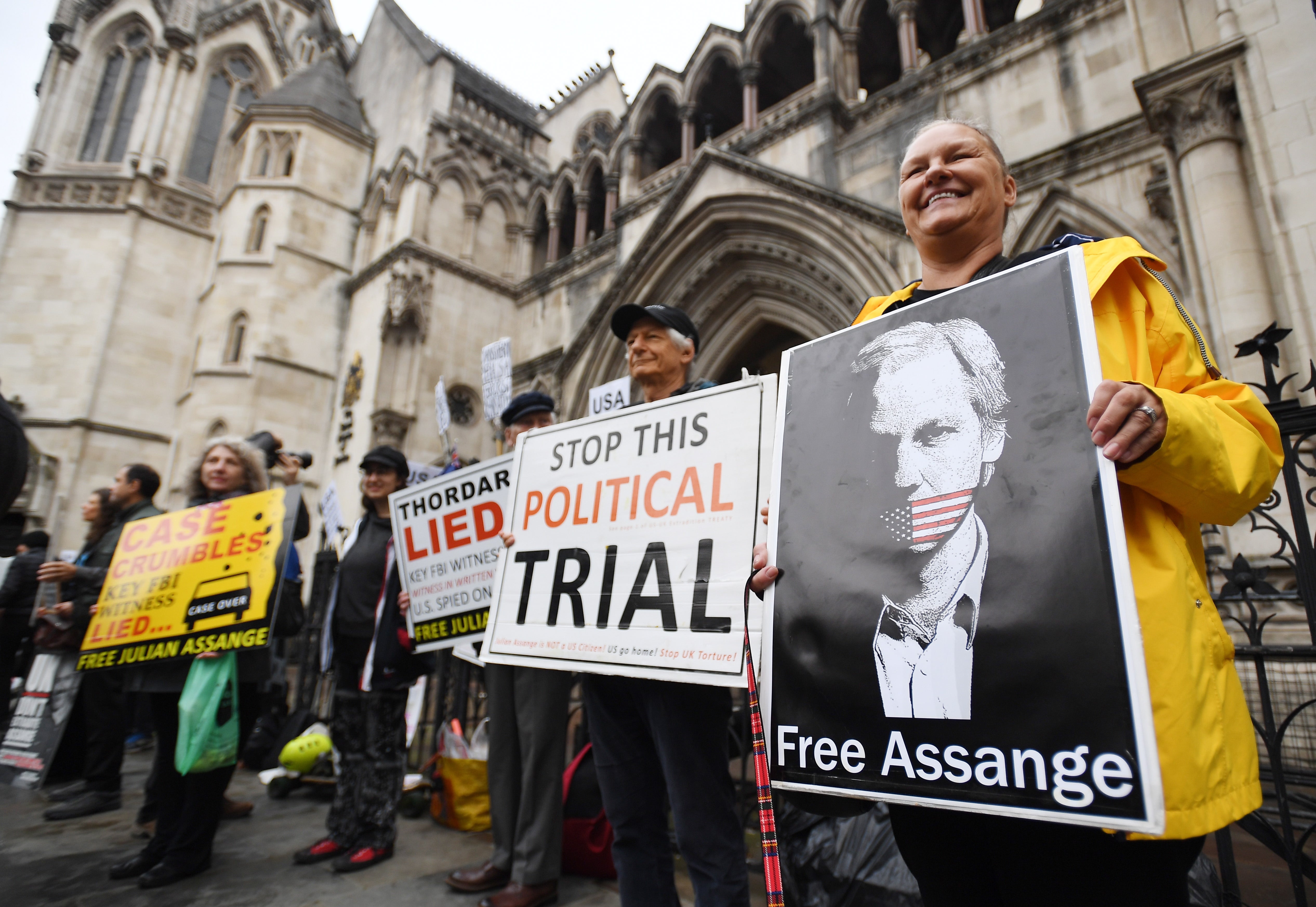Julian Assange: ‘Suicide risk’ should not block trial, US says as extradition hearing begins
WikiLeaks founder watches via video-link from prison as lawyer argues district judge made mistake in earlier ruling

Your support helps us to tell the story
From reproductive rights to climate change to Big Tech, The Independent is on the ground when the story is developing. Whether it's investigating the financials of Elon Musk's pro-Trump PAC or producing our latest documentary, 'The A Word', which shines a light on the American women fighting for reproductive rights, we know how important it is to parse out the facts from the messaging.
At such a critical moment in US history, we need reporters on the ground. Your donation allows us to keep sending journalists to speak to both sides of the story.
The Independent is trusted by Americans across the entire political spectrum. And unlike many other quality news outlets, we choose not to lock Americans out of our reporting and analysis with paywalls. We believe quality journalism should be available to everyone, paid for by those who can afford it.
Your support makes all the difference.Supporters of Julian Assange gathered outside the High Court as the US began its bid to overturn a decision not to grant his extradition on spying charges.
Signs saying “no extradition”, “truth” and “free Julian Assange” were accompanied by loud music and chants near the steps leading up to the court in central London on Wednesday as the two-day hearing began.
Assange, 50, is wanted in the US on allegations of a conspiracy to obtain and disclose national defence information following WikiLeaks’ publication of hundreds of thousands of leaked documents relating to the Afghanistan and Iraq wars.
The Australian initially indicated he would not be appearing in court via video-link from Belmarsh Prison, where he has been since 2019, but later appeared partly off-screen wearing a black face covering, white shirt and dark tie as he observed the hearing.
Both the main court and an overflow court at the Royal Courts of Justice were completely full as media and members of the public gathered to watch the first day of proceedings.
In January, District Judge Vanessa Baraitser ruled Assange should not be sent to the US, citing a real risk of suicide. The judge concluded there was a real risk he would be submitted to “special administrative measures” and detained at the ADX Florence Supermax jail - a maximum security prison near Colorado - if extradited.
Bu the US has since provided assurances, including that it would consent to him being transferred to Australia to serve any prison sentence he may be given.
James Lewis QC, representing the US Court of Appeal, on Wednesday argued the district judge “entirely based her decision” on the risk Assange would be submitted to special administrative measures and detained at the ADX Florence Supermax jail, if extradited.
He said the assurances over Assange’s treatment meant District Judge Vanessa Baraitser should have ruled in favour of his extradition.

The US authorities have also argued Assange is well enough to be extradited, with Mr Lewis telling the court his mental illness “does not even come close” to being severe enough to prevent being sent to the US.
Mr Lewis told the court Ms Baraitser based her decision on Assange’s “intellectual ability to circumvent suicide preventative measures”, which risked becoming a “trump card” for anyone who wanted to oppose their extradition regardless of any resources the other state might have”.
“The district judge’s approach carries with it the risk of rewarding fugitives for their flight, and of creating an anomaly between the approach of the courts in domestic criminal proceedings and in extradition,” he said.

“In the domestic context, it would never be said that an individual accused of crimes of the severity of Mr Assange’s could not be put on trial, despite being fit to be tried, because of his determination to commit suicide.”
Edward Fitzgerald QC, for Assange, told the court in written arguments that the US authorities had “sought to minimise the severity of Mr Assange’s mental disorder and suicide risk”.
He continued: “It is perfectly reasonable to find it oppressive to extradite a mentally disordered person because his extradition is likely to result in his death.”
He added the assurance that Assange could be transferred to a prison in Australia if convicted was “meaningless”, adding that Assange “will most likely be dead before it can have any purchase, if it ever could”
Assange has been held in Belmarsh Prison since 2019 after he was carried out of the Ecuadorian embassy in London by police before being arrested for breaching his bail conditions.
He had entered the building in 2012 to avoid extradition to Sweden to face sex offence allegations, which he has always denied and were eventually dropped.
Assange’s partner Stella Moris and father John Shipton were among the supporters who travelled to the court for the hearing on Wednesday.
Ms Moris said she was “very concerned” for Assange’s health, telling reporters: “I saw him on Saturday, he’s very thin.”
She added: “I hope the courts will end this nightmare, that Julian is able to come home soon and that wise heads prevail.”
Supporters were also seen setting up a marquee outside the court.
Among them was Nicholas Rainer, 26, from Barking, east London, who said: “Any time Julian is in court I’m here as well. They keep trying to silence him and that means they’re trying to silence us.
“He should be free - there’s no reason for this to keep happening. Hopefully the court will do the right thing.”
The hearing is expected to end on Thursday with a decision at a later date.
Additional reporting by Press Association



Join our commenting forum
Join thought-provoking conversations, follow other Independent readers and see their replies
0Comments